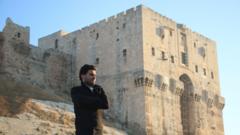Inside Aleppo, amidst the echoes of a turbulent past, emotional reunions are unfolding as families reconnect after years apart. One such poignant moment was shared by Abdulkafi, an English teacher, who embraced his 85-year-old father for the first time in two decades. Their long separation began when Abdulkafi relocated to opposition-controlled areas while his father returned to regime-held territory. This reunion was catalyzed by a surprise offensive from the armed rebel group Hayat Tahrir al-Sham (HTS) and its allies, which recently captured significant portions of Aleppo from government forces loyal to President Bashar al-Assad.
The reality in Aleppo, however, is a tapestry of conflicting emotions. While the residents express gratitude for respectful treatment from HTS fighters and observe an increase in essential services, fears of rekindled warfare are palpable. Many locals quien the emotional experience of family reunifications with ongoing apprehension about potential airstrikes from regime and ally forces, which have already claimed numerous lives. One individual expressed his worry, highlighting how these airstrikes have instilled a sense of dread reminiscent of earlier, more violent periods of the war.
Aleppo has long been a focal point in the Syrian civil war, having moved from rebel-control early in the conflict to government dominion, especially after a brutal siege in 2016. While the Syrian government claims responsibility for ongoing reconstruction efforts, NGOs and advocates criticize widespread human rights abuses occurring under its regime, intensifying distrust among the populace.
Amidst these developments, Abdulkafi shared the difficult reality for some of his relatives: fear of repercussions from regime forces upon any perceived disloyalty. He invoked George Orwell's "Nineteen Eighty-Four" to capture the sense of surveillance and control manifested by displays of Assad’s imagery throughout the city. Similar sentiments resonate across the community; one woman remarked on the prevalent anxiety reflected in faces and reactions of those around her, emphasizing a shared feeling of uncertainty.
For the city’s minority groups, the outlook remains fraught with skepticism despite HTS assurances of nonviolence against them. George Meneshian, a Greek-Armenian political analyst, noted that although local Christians had reported a calm presence following the HTS takeover, their historical experiences with Islamist factions breed cautious optimism. Residents have learned to navigate the complex waters of trust, having grown accustomed to the authoritarian yet familiar grip of Assad's regime.
Abdulkafi, now living in HTS-controlled Al-Dana, articulates a nuanced perspective, asserting that while he personally disagrees with HTS ideology, they appear willing to project a more moderate image. The landscape of Aleppo remains complex, engulfed in a struggle between hope for stability and a legacy of violence and oppression that continues to define its narrative.




















